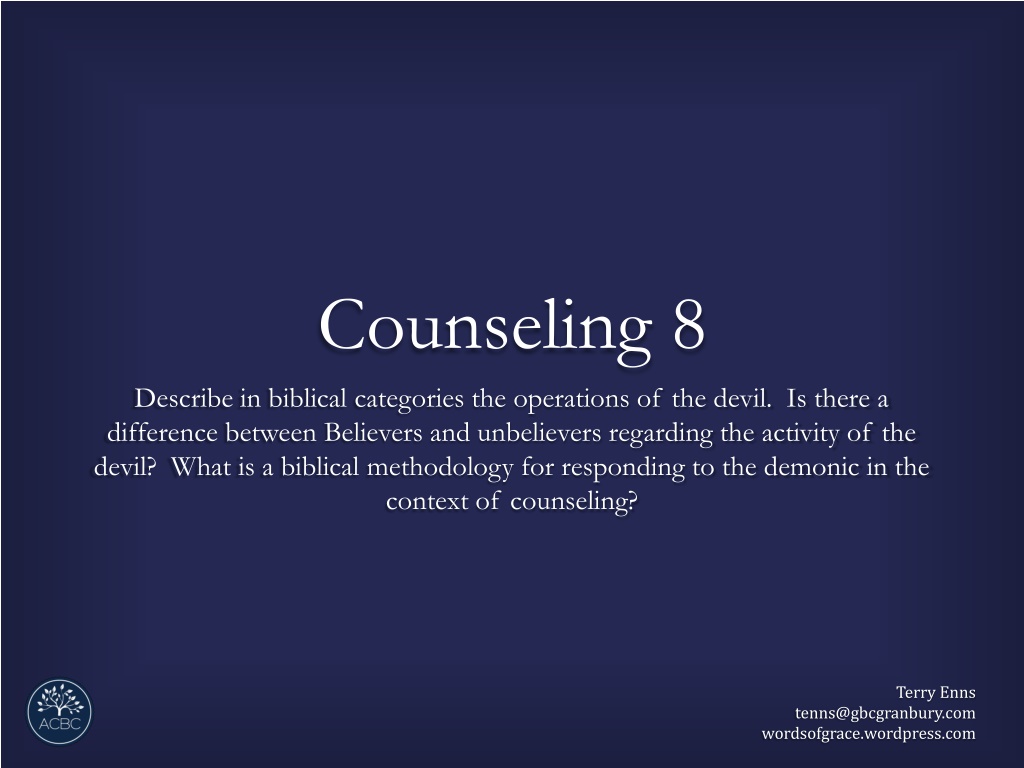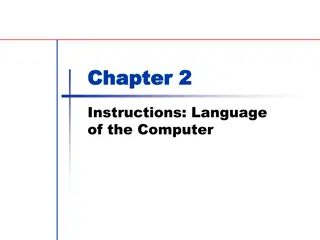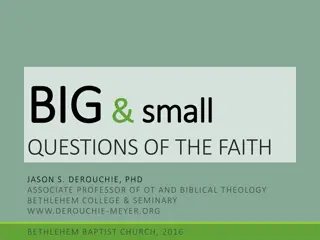Understanding the Operations of the Devil: A Biblical Perspective
The devil, known as Satan, is a key figure in the Bible with references in both the Old and New Testaments. This overview delves into his existence, personality, names, and deceptive nature, highlighting his role as the adversary of Christians. Believers and unbelievers face different challenges in dealing with the devil, but a Biblical methodology for counseling involves recognizing his tactics and standing firm in faith against his schemes.
Download Presentation

Please find below an Image/Link to download the presentation.
The content on the website is provided AS IS for your information and personal use only. It may not be sold, licensed, or shared on other websites without obtaining consent from the author. Download presentation by click this link. If you encounter any issues during the download, it is possible that the publisher has removed the file from their server.
E N D
Presentation Transcript
Counseling 8 Describe in biblical categories the operations of the devil. Is there a difference between Believers and unbelievers regarding the activity of the devil? What is a biblical methodology for responding to the demonic in the context of counseling? Terry Enns tenns@gbcgranbury.com wordsofgrace.wordpress.com
An Overview of the Devil & His Work Existence of Satan Seven books of the OT mention him (Gen. 3; Job 1-2; 1 Chron. 21; Ps. 109:6; Isa. 14:12-17; Ezk. 28:1-19; Zech. 3) Nineteen books of the NT mention him, and in the remaining books, his existence is strongly implied or referred to in other ways. Christ mentions him 25 times.
An Overview of the Devil & His Work Personality of Satan Personal pronouns are used of him (Job 1:6) Personal characteristics are ascribed to him He has intellect he deceives the world He has emotions he hates Israel & Christ He has a will
An Overview of the Devil & His Work Origin and nature of Satan his names Satan adversary or resister (52x in Scripture) Evil One He is responsible for evil (1 Jn. 5:19) Devil slanderer (1 Pt. 5:8) Serpent referring to his subtlety and craftiness Tempter (Matt. 4:3) Prince of this world (Jn. 12:31) God of this age (2 Cor. 4:4) Deceiver of the whole world (Rev. 12:9) Angel of light (2 Cor. 11:14) Accuser of the brethren (Rev. 12:10) Head of the house of evil (Hab. 3:13)
An Overview of the Devil & His Work Origin and nature of Satan his history Satan enjoyed a privileged status with God (Ezk. 28:12-15). Satan was a wise and intelligent being, perfect in beauty (Ezk. 28:12). Satan sinned and fell from his exalted position (Ezk. 28:15-17). Pride was the cause of his downfall. The five I wills of Satan are matched and superseded by the six I wills of God (Ezk. 28:16-18)
An Overview of the Devil & His Work Satan is a morally responsible person, accountable to God (Job 1:7). Satan is deceptive, scheming to defeat Christians. He is the Christian s adversary (1 Pt. 5:8). He slanders Christians (Rev. 12:10; Eph. 6:11).
An Overview of the Devil & His Work Satan is the prince of this world (Jn. 12:31; 14:30; 16:11; 2 Cor. 4:4; Eph. 2:2).
An Overview of the Devil & His Work Satan has no authority to rule men, for man was never his own master. And therefore there could be no sceptre of rule belonging to man which was transferable to Satan after the Fall. God has given Satan no dominion over man. Man is within the dominion of Satan (Acts 26:18) only because of his sin. In revolt against God, he aligned himself with Satan. In this sense Satan is his god and prince ; man is captive in the jurisdiction of darkness (Col. 1:13). [Leahy, 24.] [Satan] is not sovereign in a rival kingdom [to God], but a rebel to whom God gives as much rope as will glorify His name. [Leahy, 36.]
An Overview of the Devil & His Work Satan is the prince of this world (Jn. 12:31; 14:30; 16:11; 2 Cor. 4:4; Eph. 2:2). Satan is also not the King of Hell, where he torments others; God is determined to judge him and consign him to Hell where he will receive God s wrath for all eternity, along with all other sinners (Rev. 20:7-10). He is not sovereign in Hell; he is judged in Hell.
An Overview of the Devil & His Work Satan is powerful, but his power is limited. Do not minimize his power or speak lightly of him, but know that He is restricted by God Christ is always interceding on our behalf He is used by God to accomplish God s purposes Believers have the ability and power to resist him (we need not give in to him)
An Overview of Demons Demons, like Satan, are fallen angels Origin of demons Demons were created sinless in unconfirmed holiness, apparently given a period of time to confirm their goodness or wickedness. Some, with Satan, chose evil. God has no redemptive plan for angels once they are confirmed in their wickedness, there is no offer of grace or salvation made for them, as God made for man.
An Overview of Demons Types of demons Those who still occupy positions in the heavenlies. Those who roam the earth. Those who are currently shut up in the abyss, but will be released during the tribulation. Those who were bound at the Fall, kept in chains until the final judgment.
An Overview of Demons Characteristics of demons They are spirit beings like angels (Matt. 8:16). They are localized, not omnipresent; they are fast, but can only be in one place at one time. They are intelligent (Mk. 1:24); they are theologians (1 Tim. 4:1). They understand God and His wrath (Js. 2:19).
An Overview of Demons Activity of demons They oppose God, His angels, and His people They support the work of Satan They indwell bodies (both human and animal) They influence the mind They deceive nations They deceive people; demons work in unbelievers They are a source of apostasy (1 Tim. 4:1-3; 1 Jn. 4:1-6; 2 Thess. 2:9; Rev. 2:18-29).
Definitions: Demon Possession Demon possession means a demon residing in a person, exerting direct control and influence over that person, with certain derangement of mind and/or body. Demon possession is to be distinguished from demon influence or demon activity in relation to a person. The work of the demon in the latter is from the outside; in demon possession it is from within. By this definition a Christian cannot be possessed by a demon since he is indwelt by the Holy Spirit. However, a believer can be the target of demonic activity to such an extent that he may give the appearance of demon possession. (Ryrie)
An Overview of Demons Occurrence of demon possession Demon possession is not linked to sin or immorality. In fact, the only times demon possession is linked to moral evil it is by false accusations of demon possession and immorality Scripture speaks of the fact of demon possession, but does not identify the origin of demon possession.
An Overview of Demons Occurrence of demon possession Demon-possessed people are almost always linked with those who are suffering physically; it is a manifestation of suffering, not a statement about the moral condition of the one possessed. The casting out of demons is typically spoken of as cured or healed, like a physical disease. Demon possession is generally involuntary. Demon possession is limited to unbelievers. Satan is never said to inhabit any individual. Judgment of demons with Satan, into the lake of fire.
The Operation of the Devil / Demons The devil is a liar who provokes moral evil The devil speaks through and uses false prophets The devil is a philosopher and theologian who creates a world system to influence the thinking of individuals The devil tempts through external devices
The Operation of the Devil / Demons The devil blinds people to the truth through his false philosophies and ideologies Demons torment people physically
The Operation of the Devil / Demons Sins such as unbelief, fear, anger, lust, and other addictions, point to Satan s moral lordship, but never to demonization calling for [casting out demons]. People are victims of demonic sufferings, just as they are victims of lameness, blindness, or purely physiological seizures.
The Operation of the Devil / Demons Demonization is not spooky or morally charged any more than fever, disability, and other afflictions are morally charged. [Casting out] work was done to alleviate suffering. Jesus heals the demonized, just as he does the other sick. The result of [a casting out] deliverance is relief, peace, and the restoration of mental and physical capabilities. It does not lead directly to moral improvement except as the miracle prompts grateful faith in Jesus. [Powlison, 66-67.]
The Operation of the Devil / Demons Satan does promote and entice people to moral evil in the inner man, yet Scripture s primary emphasis is on the power of the flesh and the personal responsibility of the sinner for his sin.
The Operation of the Devil / Demons It is always our moral evil, our unbelief, pride, lusts, fears, and wickedness that need to be repented of. Moral bondage to the devil is simultaneously a slavery to the enthralling power of sin. The Bible often talks about our responsibility without even mentioning the devil, but the Bible never talks about the devil without mentioning our responsibility. The Bible does not portray moral evil however heinous or devilish as demonization to be cast out. We minister to blind slaves with all the energies of prayer, love, and truth, fighting spiritual warfare in the classic mode. [Powlison, 104.]
Key Passages and Principles Satan is a defeated foe Satan has been judged and will be judged finally; his doom is certain: He was cast out of His original position in Heaven His judgment was pronounced in Eden He was judged at the cross He will be cast out in the middle of the tribulation He will be bound in the pit for the duration of the millennium He will be cast into the lake of fire at the end of the millennium
Key Passages and Principles Satan is a defeated foe Christ defeated Satan at the cross Christ defeated death and thereby stripped Satan of his power and gave hope (confidence!) beyond the grave. God is now both just and the One who justifies; His righteousness is fully validated. This is the heart of redemption and the defeat of Satan. Christ s death and resurrection made it possible for a people to live a new and righteous life.
Key Passages and Principles Genesis 3:1-15 Satan comes to Eve as a serpent, a created being The interaction also indicates the nature of our warfare against Satan he is opposed to us, a liar and deceiver, and a murderer. Suffering and death are a consequence of the moral dilemma and are not unjust. Job 1-2
Key Passages and Principles 1 Samuel 16:13-23 He judged Saul s sinful rebellion with the demonic tormentor. He exalted David by enabling David to bless Saul with peace in the midst of Saul s suffering. James 4:7-8 1 Corinthians 16:13
Key Passages and Principles Jude 9 Michael is described as the archangel (cf. Dan. 10:13; Rev. 12:7-8; 1 Thess. 4:16). Though a (the?) pre-eminent angel, Michael refused to pronounce a defaming verdict against Satan. Michael entrusted Satan s judgment to God. By application, if Michael with all of his angelic power and authority is hesitant to rebuke Satan, but simply entrusts Satan to the condemnation of God, then no man should dare to rebuke Satan.
Key Passages and Principles Romans 8:28-29 2 Corinthians 11:14 1 Peter 5:8-9 James 2:19
Key Passages and Principles Ephesians 6:10-18 Be strong in the Lord is a passive imperative it s a command to allow God to do His work. Put on is another means of being strong in the Lord the believer wears God s provision. The armor is God s defensive protection against the schemes of the devil
Key Passages and Principles The armor of God is Truth (v. 14) Righteousness (v. 14b) Gospel (v. 15) Trust (v. 16) Assurance (v. 17a) Scripture (v. 17b)
Key Passages and Principles Romans 8:9-16 2 Corinthians 10:5 2 Timothy 2:26 1 John 5:19
A Biblical Methodology Is there a biblical mandate or permission to cast out demons? Only four NT books refer to casting out demons (Matthew, Mark, Luke, Acts). Only four other NT books even mention demons (John, 1 Timothy, James, Revelation). No biblical passages ever commend or command believers to cast out demons. Most casting out of demons is done as a means of battling and overcoming sin; Scripture never provides that as a means of our warfare against the flesh.
A Biblical Methodology Note the distinction between moral and situational evil. Many aspects of Jesus ministry are not to be copied by believers. Remember Jesus reason for casting out demons and performing signs. Christians should avoid relying on their own power and authority in dealing with demons, since even the only named Archangel (Michael) refused to rely on his own strength in dealing with Satan (Jude 9).
A Biblical Methodology What is the biblical pattern of handling suspected demon possession? Repent of sin Practice the basic pattern of sanctification (put off sin, put on righteousness, renew your mind) Take in and be absorbed with the Word of God. Resist sin by obeying the Scriptures. Disobedience was first practiced by Satan and he loves to draw people away from Christ by tempting them to disobedient rebellion. Christians should recognize the power of Satan, but not be afraid of him or his followers.
A Biblical Methodology The greatest weapon which the Church possesses is the Word of God proclaimed in the fulness of His Spirit. Here are the facts, and no fact is truly understood when divorced from the Divine revelation of Holy Scripture. The Gospel unfolded in Scripture is said to be the power of God unto salvation (Rom 1:16) When we face Satan with the sword of the Spirit, we do so with the weapon he dreads most. Our Lord in His temptation used no other weapon. Let the Lord s people unite to rely in faith and obedience upon the sole mighty Word of God, and God will give peace to them, blessing their efforts in accordance with His sovereign purpose of grace, and using the prayerful proclamation of that Word to bring about the ultimate doom of the adversary. [Leahy, 168.]
A Biblical Methodology We experience deliverance from the power of Satan when we turn consciously from darkness to the light. The one who blinds us that we might wallow in lies, lusts, and misery is sentenced to everlasting darkness, while we who once lived in fear of death now rise to life in hope of the resurrection. [Powlison, 22.]























